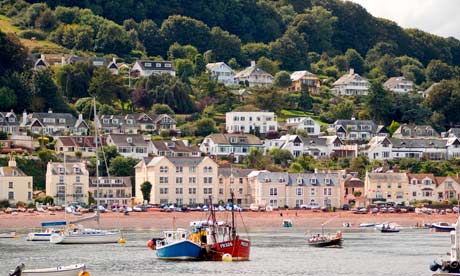
Wandering along the narrow, twisting streets of the tiny south Devon village of Shaldon, past the bowling green and rows of thatched cottages and listed Georgian homes, you wouldn't bat an eyelid if a horse-drawn carriage rolled past, or a lady swept by in Georgian dress. It seems to be the seaside village that time forgot, almost.
For nearly 200 years, residents have gathered every August on the pocket-sized red sandy beach for the annual regatta, while the distinctive black and white boat, which shuttles people across to the town of Teignmouth on the other side of the estuary, is Britain's oldest passenger ferry, dating from Saxon times. Guarding this community from the sea is the Ness, Shaldon's towering headland and cliff face, through which runs a smugglers' tunnel to a hidden beach.
But times are changing, thanks in part to one man who seems to have begun something of a gentle revolution. Tim Bouget, a Michel Roux-trained chef who was born in the region, returned in 2006 from world travels to find a handsome Georgian building for sale in narrow Fore Street. He and wife Clare bought and renovated the building, and opened it as a restaurant, named "ODE" – after the building's postcode. This year the cosy rustic restaurant features in the pages of a number of esteemed food publications, including the Michelin Guide, and the Good Food Guide. It even beat Hugh Fearnley-Whittingstall's River Cottage to bag the Sustainable Restaurant of the Year 2012 award, and is now the country's highest-rated sustainable restaurant. Local residents may have been a little suspicious of a chef who has plied his trade at a Michelin-starred restaurant in London's Park Lane opening for business in sleepy Shaldon, but most have come round.
Bouget recalls the time he and Clare forgot to lock the door of the restaurant before going out for the day. "When we came back there was a list of names, times and phone numbers on a piece of paper. People had come in, made their own reservations and left."
I have eaten there and I am not in the least surprised that even the law-abiding people of Shaldon would risk arrest to secure a table.
It may have been a bold move on the part of the couple, but ODE, with its emphasis on locally sourced quality food and its attention to sustainable detail, has inspired a sea change. Last year the tired beach-front chandlery which had been peddling buckets, spades and crab lines for years was transformed – not without some local resistance – into five splendid beach huts that spill on to the sand. (One is currently for sale at £220,000). Next door is The Clipper, a former beach-front cafe that was refurbished, extended and reopened in April 2012 as a stylish cafe run by two Italian chefs, who grow many of their own vegetables on a farm a mile away, while bread comes from the Shaldon Bakery, a craft bakery just down the road, which opened in 2009.
Further along The Strand, where a narrow road separates the beach from the handful of pubs and guesthouses, is Number One. When I visited last year this was the charming but jaded Beachcomber Café, as it had been for 20 years. Now it is a contemporary space with a centrepiece bar lined with Champagne bottles, a tapas menu and an emphasis on local suppliers, not least locally caught fish.
This summer has also seen a number of new shops opening. In June, Chicy Rachael's homeware and gift shop appeared, selling beautiful wooden bowls turned by Rachael's father, a joiner in Teignmouth, across the estuary. Two weeks ago The Yummy Shop was born – a deli with wares including gluten-free Devon farm ice cream and organic farm eggs.
Walk up the hill towards the Ness – past the Ness House Hotel, a striking Georgian building that is now a restaurant and bar with rooms – and you will find Bouget's latest venture, "cafe ODE", which opened in May in a converted stable on the hillside overlooking the river Teign. Motivated by the birth of the couple's daughter, Thula, the cafe serves affordable family food with a sustainable heart, from organic farm ice cream to a good portion of locally sourced fish and chips for £8.50. True to Bouget's passion, the building is constructed from locally quarried stone and powered by renewable energy sources, while the benches are made from reclaimed materials and the menu boards were salvaged from a skip. Bouget even regularly ventures through the nearby smugglers' tunnel to forage for sea lettuce and rock samphire at the "secret" beach.
Shaldon's salty sea air remains rich with history, but it is edging into the present in a fittingly charming way.
• For more information go to shaldon-village.co.uk

